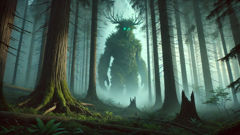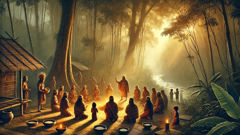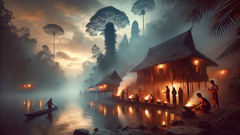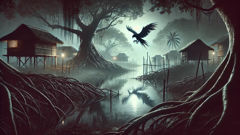Introduction
In the endless tapestry of Russian forests—where shadows linger, mists rise from mossy hollows, and ancient pines creak with secrets—there breathes a presence older than memory. The Leshy, elusive guardian of the greenwood, is a creature of shifting shape and size. He is as tall as the treetops or as small as a blade of grass, a being woven from bark, leaves, and legend. His laughter can twist the wind, his footsteps leave no mark, and when he wishes, he can turn even the surest traveler hopelessly lost. For generations, villagers on the fringes of these wild domains whispered his name with awe and caution, leaving offerings at tree roots and muttering charms before entering the woods. Children dared each other to catch glimpses of him, and hunters told tales of the Leshy’s mischief: milk gone sour, paths that looped back to the same old stump, footprints that changed shape in the mud. But beneath the tales lay a deep respect, for the Leshy was more than a trickster—he was the boundary between the world of men and the sacred wild. To anger him meant the forest would turn against you: wolves might stalk your path, rivers might swallow your boat, or sudden storms might fell your home. Yet those who honored the Leshy, who listened to the wind’s language and left gifts of bread or salt, sometimes found their hunts plentiful, their woodpiles dry, and their children safe from harm. In a time when survival meant harmony with nature, the legend of the Leshy was not just a story, but a reminder: the forest is alive, it remembers, and it is never truly empty.
The Village at the Forest’s Edge
The village of Lesnaya Sloboda huddled at the fringe of the forest like a cluster of timid children pressing close to their mother’s skirts. Here, life was measured by the turning of seasons and the moods of the woods. Wooden houses leaned together for warmth, smoke drifting upward in pale ribbons. Beyond the last fence, the world transformed: the sky vanished into a cathedral of green, and silence reigned, broken only by the occasional call of a jay or the distant howl of wolves.
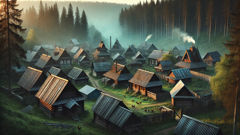
On a chill morning in early spring, the village woke to find that its luck had changed. The old healer’s cow was missing, as were three chickens and a goat. Tracks led to the forest, then disappeared. Ivan Petrovich, the village elder, called the people together in the square. His beard was as white as snow on pine branches, and his eyes were sharp with worry. “We must not have shown proper respect,” he muttered, glancing at the treeline where the shadows lingered long after sunrise. “The Leshy is displeased.”
Children huddled behind their mothers’ skirts, wide-eyed. Older folk crossed themselves or whispered charms. Ivan’s granddaughter, Darya, felt a thrill of fear and excitement. She was barely fifteen, but she’d heard stories all her life: the Leshy’s voice was the wind in the high branches, his gaze the glint of green in the dark. But Darya, unlike most, felt no dread. She was curious, bold as a fox and twice as clever. She had seen things in the woods—strange tracks, trees that seemed to move when she looked away, mushrooms forming patterns like runes in the moss.
The villagers decided on an offering: bread, salt, and honey, wrapped in linen and placed at the oldest oak. Ivan led the procession, Darya at his side. As they walked, a hush fell, as if even the birds were listening. At the edge of the woods, Ivan knelt, setting down the offering with trembling hands. He spoke the old words: “Spirit of the forest, forgive our trespass. Take this gift and keep us safe.”
When they returned, the air felt lighter. That night, a storm broke, rain washing away footprints and fear. But Darya did not sleep. She watched the trees from her window, wondering what might be watching back.
The days grew warmer, but the forest did not yield its secrets. Ivan grew restless. The livestock losses continued, and once, a young boy vanished for an afternoon, only to be found standing dazed at the edge of the woods, pockets full of wild berries and his hair tangled with leaves. He spoke of a tall man with a beard of moss, who sang to him in a voice like rustling branches. The villagers were frightened, but Darya’s curiosity only deepened. That night, she made up her mind: she would enter the forest alone and seek out the Leshy.
Into the Greenwood’s Heart
Darya set out before dawn, leaving a note beneath her pillow so her grandmother would not worry too soon. The world was silver with dew as she slipped into the woods, carrying nothing but a loaf of bread, a pinch of salt, and her father’s old knife. With each step, the air changed: the village noises faded, replaced by the symphony of forest life—chirring insects, the tap of woodpeckers, the distant patter of rain on leaves high above.
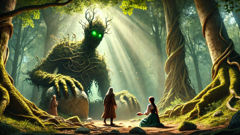
She walked paths she’d known as a child, but soon even those grew strange. Trees twisted in unfamiliar ways; the ground seemed to shift beneath her feet. A sense of being watched prickled her skin. Once, she glimpsed a fox darting through bracken. Another time, she stumbled upon a ring of mushrooms so perfect it seemed crafted by hands unseen. Remembering old tales, she whispered thanks and left a crumb of bread on the moss.
As midday approached, shafts of sunlight pierced the canopy, painting shifting patterns on the forest floor. Suddenly, Darya came to a clearing she had never seen before. At its center stood a great stone, half-sunken and furred with lichen, surrounded by ancient trees whose roots writhed like the fingers of giants. The air was thick with the scent of earth and green things.
Here, she sensed something extraordinary. A hush deeper than silence pressed all around. Then, from behind the stone, he appeared.
The Leshy was neither man nor beast. His form was tall—taller than any man Darya had seen—yet he seemed woven from the forest itself. His skin was bark; his beard tangled roots and moss; his eyes gleamed green as new leaves. When he spoke, it was like wind through branches: low, musical, and echoing.
“Why do you seek me, child of men?”
Darya found her voice. “Our village has lost your favor. I want to know why.”
The Leshy’s gaze sharpened. “Few come seeking truth. Fewer still come with respect.”
She knelt, offering bread and salt. The Leshy considered her a long moment, then accepted with a slow, deliberate movement.
“Your people have forgotten the old ways,” he said. “They take more than they give. The balance is broken.”
Darya listened as he spoke of rivers poisoned by careless hands, groves chopped for firewood without offerings or thanks. He told her of animals driven from their dens and birds silenced by fear. His sadness was as deep as the forest itself.
Moved, Darya promised to bring his message back to the village. But the Leshy was not yet finished. “Words alone are not enough. To restore balance, you must show respect—and face the forest’s trial.”
Before she could protest, the world spun. Roots snaked around her feet; shadows closed in. She was alone, or so it seemed—lost in a place where every tree looked the same. Darya realized: the trial had begun.
She wandered for hours, hunger and fear growing. But she remembered the stories: if you lose your way, turn your clothes inside out, wear your shoes on the wrong feet, or speak the Leshy’s name backward. She tried all, but nothing worked.
As dusk fell, she heard singing—a strange, wild melody. She followed it to a stream where the Leshy waited, smaller now, no taller than she was.
“Clever child,” he said. “You did not despair. You remembered respect. That is what the forest needs.”
He gave her a seed, shining with golden light. “Plant this at the heart of your village. Care for it, and you will know my favor.”
Darya thanked him and found herself back at the forest’s edge as night descended.
The Seed of Renewal
Darya stumbled out of the woods just before midnight. The village was quiet—only a few windows glowed faintly, lanterns guttering in the breeze. Her hands still clutched the Leshy’s seed, warm with its own inner light. She hurried to Ivan’s cottage and woke her grandfather with her tale. He listened, grave and silent, then roused the rest of the villagers.
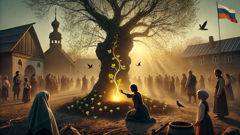
They gathered in the square, sleepy and skeptical. Some scoffed at her story, but others saw the truth in her eyes and the glow of the seed. Ivan spoke: “We have forgotten respect. Let us listen to Darya and honor the spirit who protects these woods.”
At dawn, the villagers followed Darya to the center of the square. She knelt and planted the seed beneath the oldest linden tree. The ground trembled; a green shoot sprang up, unfurling leaves before their eyes. Birds sang from rooftops. The air grew rich and sweet with the scent of growing things.
From that day, Lesnaya Sloboda changed. The people took only what they needed from the forest and left offerings of bread, salt, or wildflowers at its edge. Hunters gave thanks for every animal taken; woodcutters asked permission before felling trees. The villagers watched over the new sapling, which grew faster than any tree they’d known—its branches spreading shade over the square, its roots drawing water from deep beneath the earth.
The Leshy visited Darya in dreams, guiding her in the old ways: how to read animal tracks, find healing herbs, and sense the moods of weather and woods. She became the village’s new healer and wise woman, respected by all.
There were still times when the forest grew restless—storms that tore at rooftops, wolves that circled close—but never again did the Leshy turn truly against them. Children grew up learning both fear and reverence for the wild. And sometimes, on misty mornings, villagers glimpsed a tall figure striding through the woods, moss in his beard and laughter in his voice—a guardian spirit forever watching over his green domain.
Conclusion
The legend of the Leshy endured long after Darya’s time. Her story became a lesson passed down through generations: that nature’s guardians reward respect and punish arrogance, and that balance between humanity and the wild is both fragile and precious. The great tree at the center of Lesnaya Sloboda became a symbol—its branches sheltering festivals and its roots entwined with every joy and sorrow of village life. Travelers who visited the village noticed how lush the fields were, how clear the streams ran, and how every child seemed to know the names of birds and herbs. When asked the reason, elders would only smile and point to the tree, hinting at a pact with a guardian who watched from the shadows of the woods. And still, on certain evenings when mist curled through the trees and moonlight silvered the ground, villagers would leave bread and salt on a flat stone at the forest’s edge—just in case the Leshy was watching, waiting, reminding them that respect for nature is the heart of every good life.

